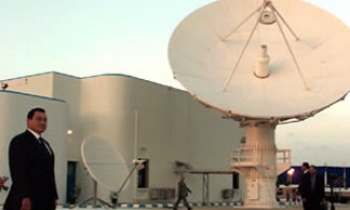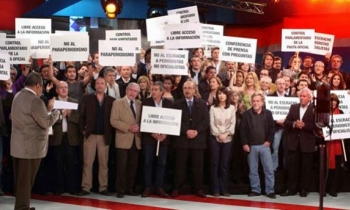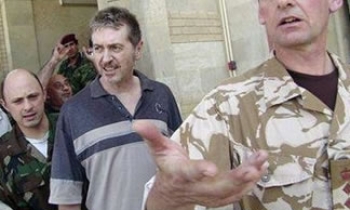BEIRUT, Lebanon -- Lebanon apologized Monday to Denmark after thousands of rampaging Muslim demonstrators set fire to the building housing the Danish mission in Beirut _ the most violent in a growing string of worldwide protests over caricatures of Islam's Prophet Muhammad. In Afghanistan hundreds of demonstrators clashed with police and soldiers, leaving one dead and four injured.
The prime ministers of Spain and Turkey issued a Christian-Muslim appeal for calm, saying "we shall all be the losers if we fail to immediately defuse this situation."
In southern Iraq, several thousand Iraqis rallied to demand severing all ties with countries in which the caricatures were published.
The protest witnessed the burning of Danish, German and Israeli flags and an effigy of Danish Prime Minister Anders Fogh Rasmussen. Protesters called for the death of anyone who insults Muhammad and demanded withdrawal of 530-member Danish military contingent operating under British control.
Elsewhere, the main city in Indian-controlled Kashmir came to a standstill on Monday as shops, businesses and schools shut down for a day to protest the publication of caricatures in European newspapers. Dozens of Muslim protesters torched Danish flags, burned tires, shouted slogans and hurled rocks at passing cars in several parts of Srinagar.
In the Indian capital of New Delhi, riot police fired tear gas and water cannons to disperse hundreds of students from Jamia University, who chanted slogans and burned a Danish flag.
Muslim leaders in Australia demanded a newspaper there apologize after it published one of the cartoons. The News Corp.-owned Courier-Mail, the biggest newspaper in the Queensland state capital of Brisbane, apparently became the first newspaper in Australia to publish one of the Danish caricatures on Saturday despite warnings from Muslim groups.
Palestinian police in Gaza City used batons to beat back stone-throwing protesters who gathered outside the European Commission building. About 200 protesters waved green flags symbolizing the Islamic Hamas movement and the yellow flags of the secular Fatah Party. Some carried banners calling for a boycott of Danish products.
Lebanese Information Minister Ghazi Aridi said early Monday that the government had unanimously "rejected and condemned the ... riots," saying they had "harmed Lebanon's reputation and its civilized image and the noble aim of the demonstration."
"The Cabinet apologizes to Denmark," Aridi said.
Police investigating Sunday's fire and riot at the building housing the Danish mission said that, contrary to previous reports, the mission offices were intact. The fire and wrecking of offices had been confined to Lebanese businesses on lower floors.
At least one person died, 30 were injured and about 200 people were detained in Sunday's violence, officials said. Prime Minister Fuad Saniora said the arrested included 76 Syrians, 35 Palestinians and 38 Lebanese.
The Beirut violence came a day after violent protests in neighboring Syria, including the burning of the Danish and Norwegian missions. The United States accused the Syrian government of authorizing the protests in Lebanon and Syria, an accusation also made by anti-Syrian Lebanese politicians.
Thousands also took to the streets Sunday elsewhere in the Muslim world and parts of Europe, including some 3,000 Afghans who burned a Danish flag and demanding that the editors at Jyllands-Posten _ which originally published the cartoons _ be prosecuted for blasphemy. Afghan President Hamid Karzai urged forgiveness.
The Islamic Army in Iraq, a key group in the insurgency fighting U.S.-led and Iraqi forces, posted a second Internet statement Sunday calling for violence against citizens of countries where the caricatures have been published.
Turkish Prime Minister Recep Tayyip Erdogan and Spanish Prime Minister Jose Luis Rodriguez Zapatero published a column in the Paris-based International Herald Tribune saying the dispute "can only leave a trail of mistrust and misunderstanding between both sides."
"Therefore, it is necessary to make an appeal for respect and calm, and let the voice of reason be heard," Erdogan and Zapatero wrote. Last year, their governments presided over the launch of the Alliance of Civilizations, a U.N.-sponsored program to counter extremism and promote respect among cultures.
The Lebanese interior minister submitted his resignation at the late Sunday cabinet session. The parliamentary opposition and even some Cabinet colleagues of Interior Minister Hassan Sabei demanded he step down, but the government appeared divided, saying it only "took note" of the resignation offer.
The attack on the Danish mission in Beirut took on a sectarian dimension in this mixed Muslim-Christian nation, which suffered a 1975-90 civil war. Muslim extremists took over the streets in the Christian Ashrafieh neighborhood where the Danish mission is located, wreaking havoc on property for about three hours.
Muslim clerics also denounced the violence Sunday, with some wading into the mobs to try to stop the attacks.
There was widespread criticism of the failure of the Lebanese security forces, which appeared to lose control of the streets for about three hours. But Sabei defended their actions.
"Things got out of hand when elements that had infiltrated into the ranks of the demonstrators broke through security shields," he told reporters. "The one remaining option was an order to shoot, but I was not prepared to order the troops to shoot Lebanese citizens."
Sabei, like other Lebanese politicians and Grand Mufti Mohammed Rashid Kabbani, spiritual leader of Lebanon's Sunni Muslims, suggested that Islamic radicals had fanned the anger to "distort the image of Islam."
Anti-Syrian politicians in Lebanon also saw Syria's hand at work. Relations between Beirut, where the government now is dominated by anti-Syrians, and Damascus have deteriorated since Syria's troop withdrawal in April after the assassination of former Lebanese Premier Rafik Hariri.
"It seems that through sending weapons and men and using some Syrian workers they (the Syrians) want to say that Lebanon will face chaos as a result of their departure from Lebanon," Walid Jumblatt, a leading anti-Syrian politician, wrote in several Monday newspapers.
The drawings _ including one depicting the prophet wearing a turban shaped as a bomb with a burning fuse _ have caused Muslim fury worldwide. Islamic law is interpreted to forbid any depictions of the Prophet Muhammad for fear they could lead to idolatry.
The caricatures have since been republished in several European and New Zealand newspapers as a statement on behalf of a free press.
Denmark's Prime Minister Anders Fogh Rasmussen has said he disapproves of the caricatures, but insisted he cannot apologize on behalf of his country's independent press.









